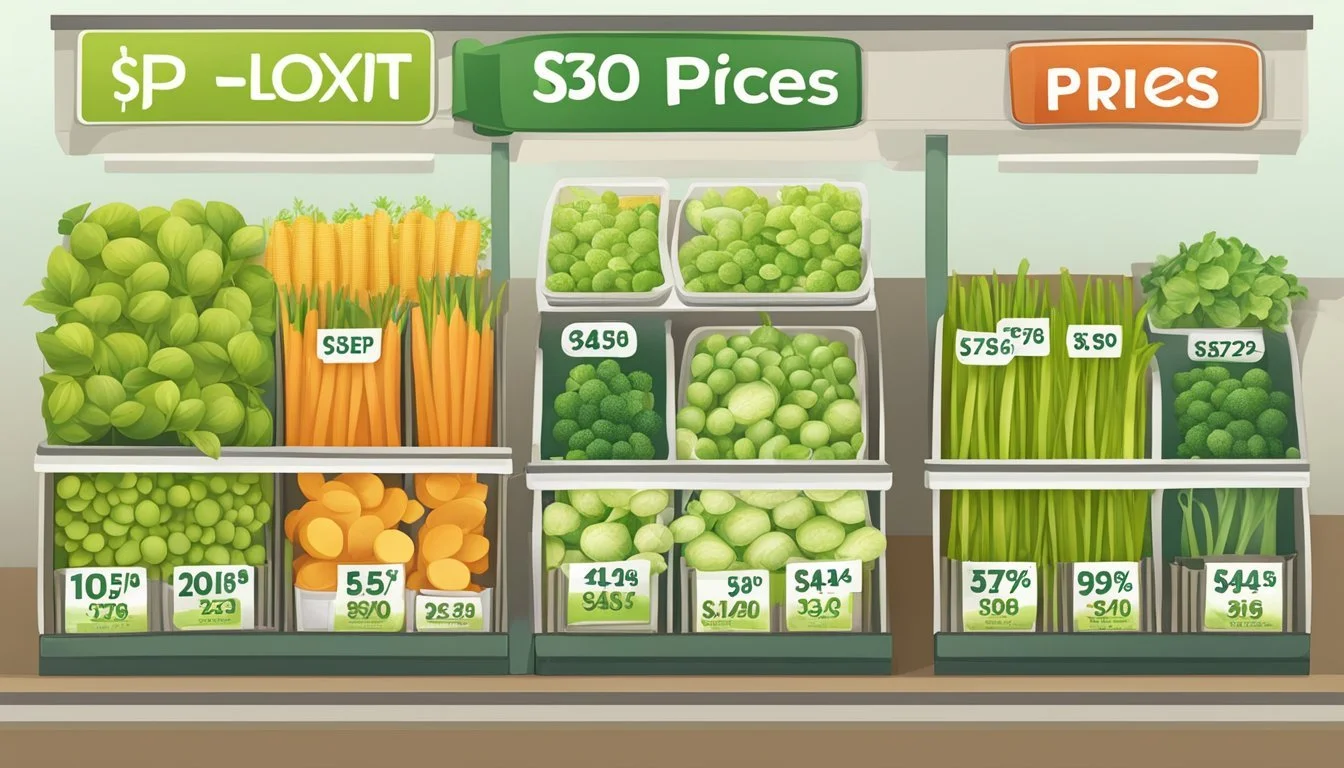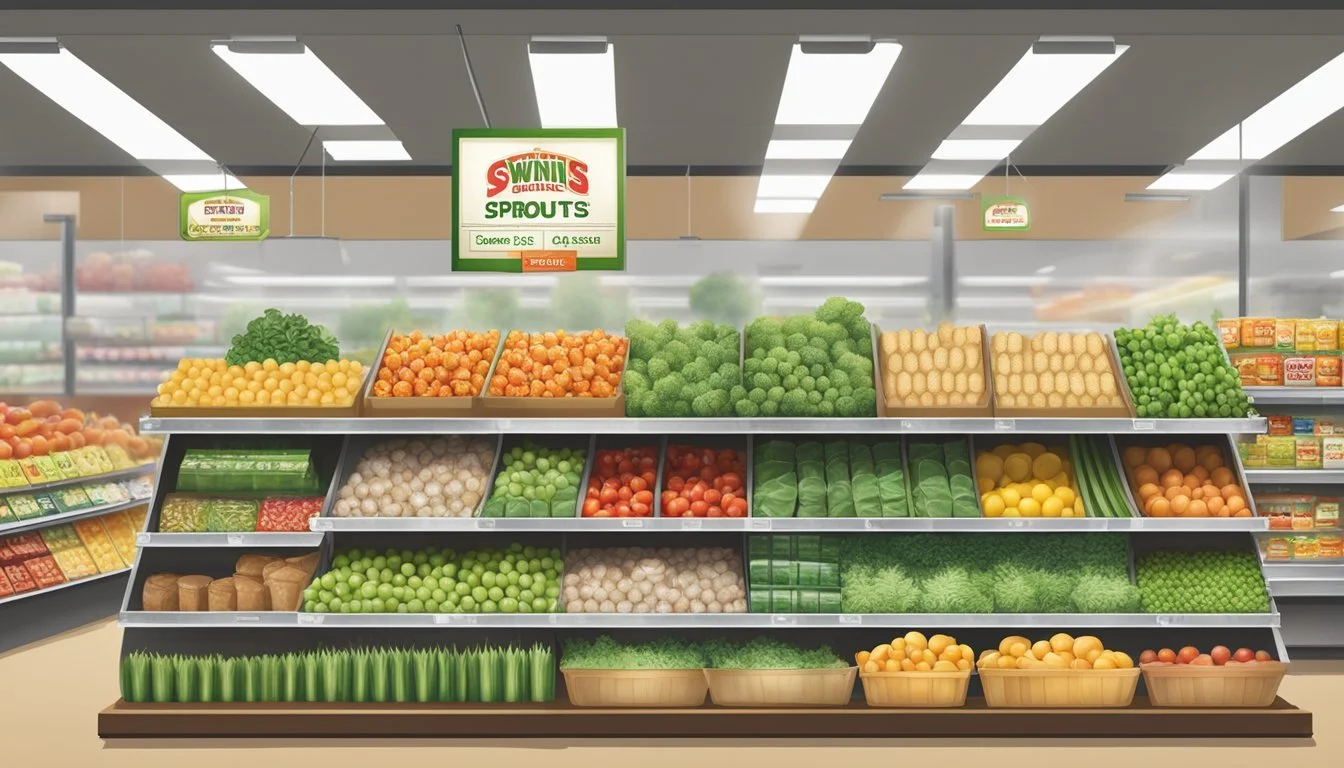Is Sprouts Cheaper Than Winn-Dixie?
A price comparison of popular grocery chains
Grocery shopping can be a significant expense for many households. Consumers often compare prices between different stores to find the best deals and stretch their budgets. Two popular grocery chains, Sprouts Farmers Market and Winn-Dixie, frequently come up in these comparisons.
Winn-Dixie typically offers lower prices on everyday grocery items compared to Sprouts Farmers Market. Winn-Dixie's store brand products are often priced around 20% less than national brands, providing substantial savings for budget-conscious shoppers. This pricing strategy allows customers to find affordable options on staples like white sandwich bread and raw chicken.
Sprouts Farmers Market, while generally pricier, specializes in organic and natural products. The store offers a wide variety of health-focused items that may not be as readily available at Winn-Dixie. Shoppers prioritizing organic produce or specialty health foods might find Sprouts' selection more appealing, despite the higher prices on standard grocery items.
Understanding the Retailers
Sprouts Farmers Market and Winn-Dixie are distinct grocery chains with unique offerings and market positions. Both cater to different customer segments and have established presences in their respective regions.
Profile of Sprouts Farmers Market
Sprouts Farmers Market is a specialty grocery chain focused on natural and organic products. Founded in 2002, it has rapidly expanded across the United States. The retailer emphasizes fresh produce, bulk foods, and health-conscious items.
Sprouts stores typically feature:
Wide selection of organic fruits and vegetables
Extensive bulk foods section
Natural and alternative health products
In-house butcher and deli counters
The company targets health-conscious consumers and those seeking specialty items. Sprouts operates over 350 stores in 23 states, with a strong presence in the Western and Southern regions.
Profile of Winn-Dixie
Winn-Dixie is a long-established supermarket chain primarily serving the Southeastern United States. Founded in 1925, it has deep roots in the region. The retailer offers a more traditional grocery shopping experience.
Key features of Winn-Dixie stores include:
Full-service supermarket layout
Competitive pricing on everyday essentials
Store brand products for budget-conscious shoppers
Loyalty program with fuel perks
Winn-Dixie caters to a broad customer base, focusing on value and familiar brands. The chain operates approximately 500 stores across five Southeastern states, maintaining a strong regional presence.
Comparison Factors
Examining the differences between Sprouts and Winn-Dixie requires evaluating several key aspects of the grocery shopping experience. These factors impact both cost and value for consumers.
Price Point Analysis
Winn-Dixie typically offers lower prices on everyday grocery items compared to Sprouts. Market analyses show Winn-Dixie's prices on staples like white sandwich bread and raw chicken are often 20% lower than competitors. This pricing strategy makes Winn-Dixie an attractive option for budget-conscious shoppers.
Sprouts, while generally pricier, occasionally provides competitive deals on select items. Their pricing structure tends to fluctuate more, with frequent sales and promotions that can temporarily bring costs down on certain products.
For a typical grocery basket, Winn-Dixie usually comes out as the more economical choice. However, price-sensitive consumers should compare weekly ads from both stores to maximize savings.
Product Range and Quality
Sprouts emphasizes natural and organic products, offering a wide selection of health-focused items. Their produce section is particularly noteworthy, featuring a diverse array of fresh fruits and vegetables, including many organic options.
Winn-Dixie provides a more traditional grocery selection, catering to a broader range of consumer preferences. Their product quality is generally good, with a focus on meeting everyday family needs.
Fresh meat quality can vary between locations for both chains. Sprouts often receives praise for its butcher counter offerings, while Winn-Dixie is known for competitive pricing on meat products.
Store Brand and Private Label Offerings
Winn-Dixie's private label, SE Grocers, offers significant savings compared to national brands. These products are typically 20% cheaper and are available across various categories, from pantry staples to household items.
SE Grocers products often match the quality of national brands, providing good value for money. This extensive private label range helps Winn-Dixie maintain its reputation for affordability.
Sprouts also has its own brand, but it focuses more on natural and organic products. While these items are generally less expensive than comparable national organic brands, they may still be pricier than conventional alternatives at Winn-Dixie.
Organic and Natural Product Selection
Sprouts excels in this category, with a wide range of organic and natural products across all departments. They offer extensive selections of organic produce, meats, dairy, and pantry items.
The chain's commitment to natural foods extends to its prepared foods section, featuring organic and health-conscious options. Sprouts also carries a variety of specialty diet products, catering to vegan, gluten-free, and other dietary needs.
Winn-Dixie has expanded its organic offerings in recent years but still lags behind Sprouts in this area. While Winn-Dixie stocks some organic produce and natural products, the selection is more limited and may vary by location.
Customer Service and Shopping Experience
Both chains strive to provide good customer service, but experiences can vary by location. Sprouts often emphasizes staff knowledge about natural and organic products, which can be helpful for customers new to these options.
Winn-Dixie typically focuses on efficient service and familiar grocery store layout. Their stores are designed for quick, convenient shopping trips.
Sprouts stores generally have a more open, market-like feel with produce displays prominently featured. This layout can create a more engaging shopping experience for some customers.
Wait times at checkout can fluctuate for both chains depending on location and time of day. Many stores now offer self-checkout options to reduce lines.
Convenience and Location
Winn-Dixie has a stronger presence in the southeastern United States, with more locations in rural and suburban areas. This can make it a more convenient option for shoppers in these regions.
Sprouts has been expanding but still has fewer total locations. They tend to focus on urban and suburban areas, often targeting health-conscious demographics.
Store hours can vary, but both chains typically offer similar operating times. Some Winn-Dixie locations may have longer hours, especially in areas where they serve as the primary grocery option.
Online ordering and delivery services are available from both chains in many areas, though availability and fees can differ by location. These services add a layer of convenience for busy shoppers.
Product-Specific Price Comparisons
Price differences between Sprouts and Winn-Dixie vary across product categories. Each store has areas where they offer more competitive pricing.
Meat and Seafood
Winn-Dixie often provides lower prices on conventional meat products. Their chicken breast typically costs $2.99/lb, while Sprouts charges $3.49/lb. For beef, Winn-Dixie's ground beef averages $3.99/lb compared to Sprouts' $4.49/lb.
Sprouts excels in specialty meats. Their grass-fed beef sells for $5.99/lb, undercutting Winn-Dixie's $6.49/lb. Seafood pricing is comparable, with salmon fillets at both stores around $9.99/lb.
Produce: Fruits and Vegetables
Sprouts generally offers more competitive produce prices. Their lettuce costs $1.49 per head versus Winn-Dixie's $1.79. Apples at Sprouts are priced at $0.99/lb, while Winn-Dixie charges $1.29/lb.
Tomatoes show a similar trend: $1.49/lb at Sprouts and $1.79/lb at Winn-Dixie. However, Winn-Dixie occasionally beats Sprouts on seasonal produce specials.
Dairy and Eggs
Dairy pricing varies by product. Winn-Dixie's gallon of milk costs $2.99, compared to Sprouts' $3.29. Cheese prices are similar, with cheddar at $3.99/lb in both stores.
Eggs show a noticeable difference. Winn-Dixie's large eggs are priced at $2.49/dozen, while Sprouts charges $2.99/dozen. Organic options favor Sprouts, with organic milk $0.50 cheaper per half-gallon than Winn-Dixie.
Bakery and Baked Goods
Winn-Dixie tends to have lower prices on bakery items. Their artisan bread loaves cost $3.49, while similar options at Sprouts are $3.99. Bagels are priced at $2.99 for a pack of six at Winn-Dixie, compared to $3.49 at Sprouts.
Specialty baked goods show less price disparity. Gluten-free muffins cost around $4.99 for a 4-pack at both stores.
Pantry Staples
Pantry staples reveal mixed pricing. Winn-Dixie's peanut butter is priced at $2.49 for a 16 oz jar, while Sprouts charges $2.79. Pasta shows a similar trend: $1.29 for a 16 oz box at Winn-Dixie versus $1.49 at Sprouts.
Brown sugar is cheaper at Sprouts, costing $1.99 for a 2 lb bag compared to Winn-Dixie's $2.29. Organic pantry items are generally less expensive at Sprouts, with organic quinoa priced $0.75 lower per pound than at Winn-Dixie.
Discounts and Savings Programs
Both Winn-Dixie and Sprouts offer various ways for customers to save money on groceries. These include weekly deals, loyalty programs, and digital coupons that can lead to significant discounts at checkout.
Weekly Deals and Seasonal Promotions
Winn-Dixie runs a "Down Down" program, lowering prices on over 150 everyday items. This initiative helps customers save an average of 15% on products like fresh produce, dairy, pantry staples, and frozen appetizers.
Sprouts features weekly ads with special deals on organic and natural products. Both stores adjust their promotions seasonally, offering discounts on relevant items throughout the year.
Winn-Dixie's digital coupons apply to a wide range of products, including national brands and household goods. Sprouts also provides digital coupons, often focusing on health-conscious and specialty items.
Loyalty Programs and Memberships
Winn-Dixie's SE Grocers rewards program offers substantial benefits. Members earn points on purchases, which can be redeemed for grocery discounts. The program also includes personalized deals based on shopping habits.
A standout feature of Winn-Dixie's loyalty program is the fuelperks! initiative. Customers can earn discounts on gas, ranging from 5 to 25 cents off per gallon, depending on their grocery purchases.
Sprouts' loyalty program provides members with exclusive digital coupons and personalized deals. While it may not offer fuel discounts, it caters to health-conscious shoppers with targeted promotions on natural and organic products.
Operational Considerations
Sprouts and Winn-Dixie differ in their operational approaches, impacting customer convenience and shopping experiences. These differences are evident in their store hours, accessibility, and digital offerings.
Store Hours and Accessibility
Sprouts typically operates from 7 AM to 10 PM daily, providing extended hours for early morning and late-night shoppers. Many Sprouts locations are situated in urban and suburban areas, often in shopping centers or standalone buildings with ample parking.
Winn-Dixie stores generally open at 7 AM and close at 10 PM or 11 PM, depending on the location. Their stores are more prevalent in southeastern states, with a mix of urban, suburban, and rural locations. Winn-Dixie often anchors shopping plazas, offering convenient access for local communities.
Both chains prioritize accessibility, with most stores featuring wide aisles and clear signage. However, Winn-Dixie tends to have larger store formats, which may require more walking for customers.
Online Shopping and Delivery Options
Sprouts offers online shopping through their website and mobile app. Customers can choose between in-store pickup and home delivery, often partnering with third-party services like Instacart for fulfillment.
Winn-Dixie provides similar e-commerce options, allowing customers to shop online for pickup or delivery. They also utilize their own delivery service in some areas, alongside partnerships with platforms like Shipt.
Both chains have invested in user-friendly interfaces for their digital platforms. Sprouts tends to emphasize its natural and organic offerings in its online experience, while Winn-Dixie focuses on promotional deals and everyday essentials.
Alternative Grocery Shopping Options
When comparing grocery prices, it's helpful to look beyond just Sprouts and Winn-Dixie. The grocery landscape offers numerous options that can provide value and variety for shoppers.
Comparing to Major Competitors
Walmart consistently offers low prices on groceries, often beating other chains. Their Great Value brand provides budget-friendly alternatives to name brands. Target's grocery section has expanded, with its Good & Gather line offering quality at competitive prices. Kroger operates under various banners and provides a mix of national and private label products.
Aldi and Lidl, known for their no-frills approach, often have the lowest prices on many items. Costco and Sam's Club offer bulk buying options that can result in significant savings for larger households. Trader Joe's has carved out a niche with unique, affordable products.
• Walmart: Low prices, wide selection • Aldi/Lidl: No-frills, budget-friendly • Costco/Sam's Club: Bulk savings • Trader Joe's: Unique, affordable items
Understanding Local Market Variations
Grocery prices can vary significantly based on location. Regional chains like Publix in the Southeast and Wegmans in the Northeast often command loyalty through quality and customer service, though prices may be higher. Safeway and Albertsons, now merged, have a strong presence in the West and offer competitive prices through their loyalty programs.
Local market conditions, distribution networks, and competition all play a role in pricing. Urban areas might see higher prices due to increased operating costs, while rural locations may have fewer options but potentially lower prices.
• Regional variations: Publix (Southeast), Wegmans (Northeast) • Urban vs. Rural: Price differences due to operating costs and competition • Loyalty programs: Can provide savings at chains like Safeway/Albertsons
Final Considerations
Price comparisons between Sprouts and Winn-Dixie reveal deeper trends in consumer behavior and market dynamics. These factors shape the shopping experience and influence supermarket strategies.
Health and Dietary Trends
Health-conscious consumers increasingly seek organic and natural products. Sprouts caters to this demand with a wide selection of organic produce and specialty health foods. Winn-Dixie has expanded its organic offerings to compete in this space.
Dietary trends like gluten-free, keto, and plant-based diets drive product selection. Sprouts excels in providing options for these lifestyles. Winn-Dixie has improved its range but may not match Sprouts' depth in some categories.
Nutritional awareness impacts purchasing decisions. Both stores now prominently display nutritional information and offer healthier alternatives to traditional products.
Impact of Consumer Choice on Supermarket Strategy
Consumer preferences shape store layouts and product placement. Sprouts emphasizes its produce section, while Winn-Dixie features competitive pricing on staple items.
Digital engagement has become crucial. Both chains have developed mobile apps and online ordering systems to meet evolving shopping habits.
Store brands play a significant role in pricing strategies. Winn-Dixie's private label products often undercut national brands, while Sprouts focuses on natural and organic store brands.
Loyalty programs have become key differentiators. Winn-Dixie's rewards program offers fuel discounts, while Sprouts provides targeted promotions based on purchase history.





